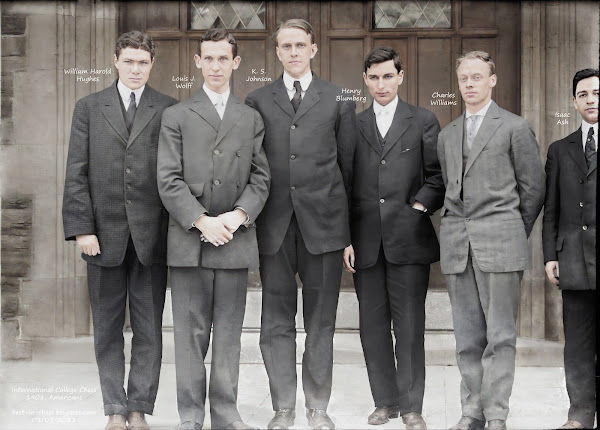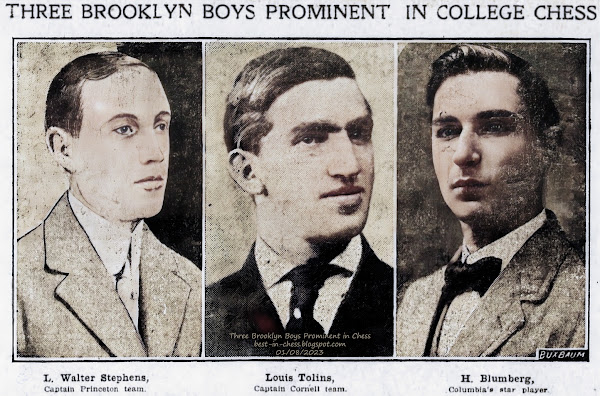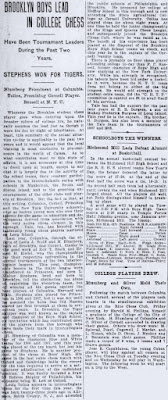March 22 1908
 Americans In Lead In Chess Cable Match 22 Mar 1908, Sun The Brooklyn Daily Eagle (Brooklyn, New York) Newspapers.com
Americans In Lead In Chess Cable Match 22 Mar 1908, Sun The Brooklyn Daily Eagle (Brooklyn, New York) Newspapers.com
Americans In Lead In Chess Cable Match.
Have One Point Advantage in Intercollegiate Contest With England.
TWO GAMES STILL UNDECIDED
Louis J. Wolff of Columbia Plays Brilliantly Against Cambridge Opponent—Play by Boards.
Philadelphia, March 21—Bent on winning back the laurels lost by the British chess players in the match of a week ago, the team representing Oxford and Cambridge in London faced the sextet representing Columbia, Harvard, Yale, Princeton, Cornell, Brown and Pennsylvania, in the eighth of the series of intercollegiate contests by cable for the Rice trophy to-day. When play ceased, at 6:30 o'clock this evening, the Americans had the advantage, with a score of 2½ points to 1½, two games remaining unfinished. Thereupon draws were offered to the Britons on the two boards, but the latter declined, preferring that they be adjudicated upon by Referee Walter Penn Shipley of this city. Mr. Shipley would not give his decision on the spot, and stated it might be a week before his opinion was given. The opinion is freely expressed by experts in attendance here to-night that the Americans will retain their lead after the adjudication, and in that way win the match and the trophy.
Louis J. Wolff, captain of the Columbia varsity team, pulled his game out of a very complicated situation, and scored for America, as did C. Williams of Princeton, who found a flaw in the combination of his opponent. W. H. Hughes of Pennsylvania was beaten at the top board by N. J. Roughton of Oxford, K. S. Johnson of Harvard drew his game with B. H. R. Stower of Cambridge, the draw being agreed to at the close of the match.
The match was played from the hall of the Houston Club and the Inns of Court Hotel, the two places being connected by direct commercial cables. Not a hitch occurred the entire day. It was the first time that play on this side has taken place on the campus of a university.
Play began shortly after 8 o'clock in the morning, with the two sextets paired in the following order:
Board 1—W. H. Hughes, Pennsylvania, vs. N. J. Broughton, New College, Oxford.
Board 2—L. J. Wolff, Columbia, vs. L. Illingworth, Trinity College, Cambridge.
Board 3—K. S. Johnson, Harvard, vs. B. H. R. Stower, Queens College, Cambridge.
Board 4—N. Blumberg, Columbia, vs. H. Lob, King's College, Oxford.
Board 5—I. Ash, Pennsylvania, vs. C. G. Woodhouse, Pembroke College, Cambridge.
Board 6—C. Williams, Princeton, vs. R. Petrie, Balliol College, Oxford.
Walter Penn Shipley of this city, umpire for the British collegians, won the toss for move, and elected that Oxford and Cambridge play the white pieces on the odd numbered boards. The Americans, therefore, had the choice of openings on boards 2, 4 and 6. The Ruy Lopez, or Spanish attack, was chosen by the players at the five top boards, but the variations followed were not at all monotonous. At the sixth board, the Englishman resorted to the Petroff defense.
Owing the absence of R. T. Black of Cornell, I. Ash of the University of Pennsylvania, who played in the recent state tournament, was called upon to fill the vacancy.
Wolff of Columbia was pitted against the same player whom he defeated in the match a year ago, and the first seven moves made to-day were identical with those of their game of a year ago. Then it was Illingworth who varied.
Of the Americans who defended the Ruy Lopez, Hughes and Ash both chose the Berlin defense. The former lost some time with his queen's bishop, which retarded his development somewhat, but Ash obtained a satisfactory position from a book line of play. Johnson defended with 5. … P-QR3 defense, and his opponent continued with the steady attack initiated by the advance of the queen's pawn one square. Wolff was met by the 3. … P-QR3 defense, and opened the queen's rook file, but otherwise his adversary established a good position. Blumberg faced the interesting counter attack of 3. … P-B4, from which Lob built up an excellent game. In the Petroff defense at the sixth board, Williams neglected an opportunity of advancing his king's rook pawn on the tenth move with effect, and, as a result, a black knight was entrenched strongly in the Princeton player's field.
Hughes' position went from bad to worse, until finally on the twenty-fifth move Boughton sacrificed a knight in brilliant fashion. The Englishman's rooks and queen obtained access to the black king, and Hughes was forced to resign after twenty-nine moves.
Wolff succeeded in winning his opponent's weak queen's knight's pawn, but, in the end, had to give his king's pawn in return. While Wolff was left with a passed pawn on the queen's wing, Illingworth had a formidable center.
Stower had a passed pawn at K6 against Johnson of Harvard, and the latter did not get a very promising game.
Blumberg castled on the queen's side, exchanging queens on the seventeenth move. He had slightly the better position.
Lively play was witnessed between Woodhouse and Ash, but equality was maintained, although Ash's queen's bishop was out of play.
The misfortunes which befell Hughes was offset at the sixth board, where Williams of Princeton won a piece on the seventeenth move in consequence of an unsound combination made by Petrie.
































